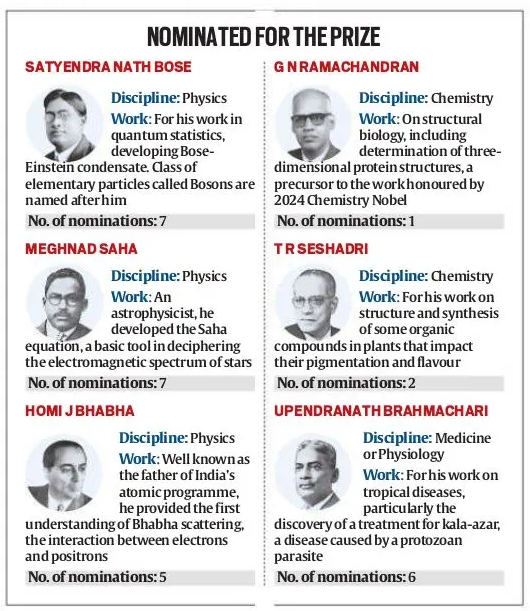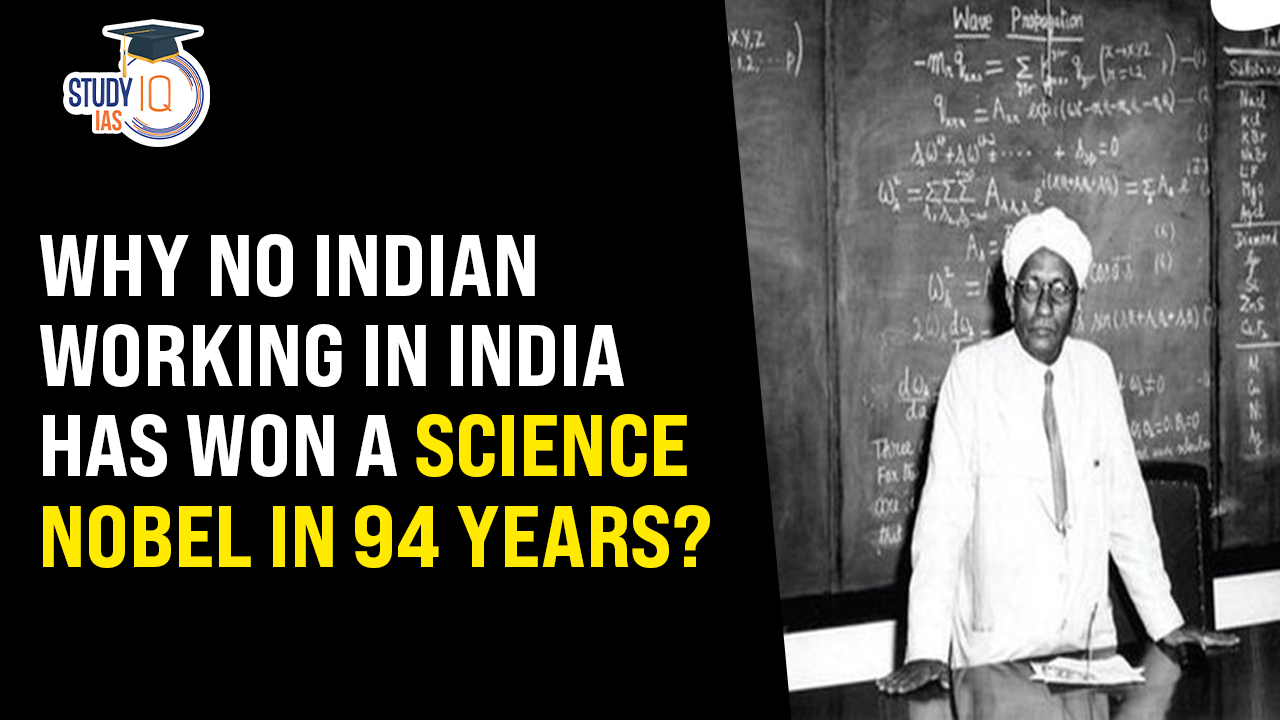Table of Contents
Nobel Prize Nominations Without Awards

Omitted From Nomination
- Jagadish Chandra Bose: Demonstrated wireless communication in 1895 but was never nominated despite his earlier work being recognized with a Nobel Prize awarded to others later.
- S. Krishnan: Co-discovered the Raman scattering effect with C.V. Raman but was also overlooked for a nomination.
- N.R. Rao: Considered for a Nobel Prize in solid-state chemistry but has not yet received one.
| Did You Know? |
| Three other Indian-origin scientists have won Nobel Prizes—Hargovind Khorana (Medicine, 1968), Subrahmanyan Chandrasekhar (Physics, 1983), and Venkatraman Ramakrishnan (Chemistry, 2009)—but they were working outside India and were not Indian citizens at the time of the award. |
Challenges in India’s Nobel Prize Pursuits in Science
- Limited Focus on Basic Research: India’s scientific progress is hampered by inadequate attention to fundamental research, reducing the scope for groundbreaking discoveries.
- Insufficient Public Funding: Research funding in India is low compared to global standards, limiting resources available for scientists to pursue advanced scientific inquiries.
- Excessive Bureaucracy: Scientific research is often slowed down by bureaucratic red tape, making it difficult for scientists to navigate funding processes and institutional requirements.
- Lack of Private Research Opportunities: There are few incentives or infrastructure to encourage private sector involvement in research and innovation.
- Deteriorating Research in Universities: Many Indian universities have seen a decline in their research capabilities, further restricting the development of future Nobel-worthy scientific work.
- Small Pool of Researchers: The number of researchers in India is significantly lower than the global average, reducing the chances of producing high-impact scientific work.
Other Countries Performance in Science Nobels
- Israel: Despite having strong scientific indicators and a high proportion of Nobel laureates globally (especially among the Jewish community), Israel has won only 4 Nobel Prizes in Chemistry.
- China: Despite significant investment in research, China has produced only 3 Nobel winners in the sciences.
- South Korea: A scientific powerhouse, yet no Nobel laureates in science.
Nobel Prize Trends
- The United States and Europe dominate Nobel Prizes in the sciences, attracting scientists from other regions.
- Only 13 Physics, 15 Chemistry, and 7 Medicine Nobel laureates have come from outside North America and Europe.
- Japan has the largest number of science Nobels outside of these regions, with 21 prizes.
- Though there have been occasional accusations of bias, the research ecosystems in the U.S. and Europe remain superior.
Future Prospects
- China: With significant investments in areas like clean energy, quantum computing, and artificial intelligence, China may see an increase in its Nobel wins soon.
- India: Without a strong research ecosystem or adequate support for scientific endeavours, India’s Nobel success will continue to depend on individual brilliance rather than institutional support.
| Related Articles |
| Nobel Prize in Medicine 2024 |
| Nobel Prize in Physics 2024 |
| Nobel Prize in Chemistry 2024 |
| Nobel Peace Prize 2024 |
| Nobel Prize in Economics 2024 |


 National Technology Readiness Assessment...
National Technology Readiness Assessment...
 Justice Mission-2025: China’s Live-Fir...
Justice Mission-2025: China’s Live-Fir...
 Suryastra: First Made-in-India Long-Rang...
Suryastra: First Made-in-India Long-Rang...

























